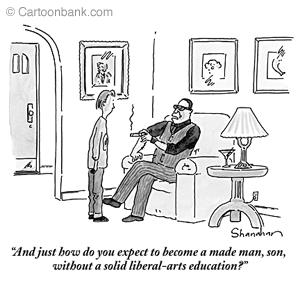What is the value of a liberal arts education? What does it provide students with (in addition to a degree in a specific major)?

A liberal arts education consists of academic subjects such as literature, philosophy, mathematics, and social and physical sciences as distinct from professional and technical subjects. In other words, liberal education programs (LEPs) encourage students to take classes outside of their majors. As opposed to more career based schools, liberal arts universities strive to give their students a wealth of knowledge in all subjects instead of just in their prospective field of work.
A liberal arts education provides students with four main things:
1. A broad range of general knowledge. LEPs force students to take required classes in all different subjects. They must take at least one course in each designated subject before they can begin taking classes focusing on their majors. This provides them with a wide range of general knowledge. According to "Liberal Arts and the Workplace" by Tim Hall, "Employers want their employees to write better, speak better, reason better. They want the so-called 'soft skills' not readily taught in the workplace itself." They are looking for people with skills that exceed just the necessities for the job. Liberal arts students are not just experts in one particular field, but instead they are well learned in a vast variety of subjects that make them well-rounded individuals.
2. Skills in critical thinking, communication, and problem solving. These students also gain skills in the previously mentioned areas because of the wide range of knowledge they gain from liberal arts. As I previously mentioned, they are not just robotically trained to perform well in one subject, they learn a little about every subject. As Michael Roth said in his article, "Why Liberal Education Matters -- A Lecture in Beijing", "[The] call for more efficient, specialized education is a self-defeating path to conformity and inflexibility." Taking these other courses gives them more experience and insight about the world that can help them solve difficult problems in their future careers. By being forced to take courses in critical thinking, technology, etc., they gain the skills to communicate and work out issues that arise in ways that students with technical/professional education could not because their educations were too specific.

3. A foundation for learning. Liberal education is the best way to provide students with the basics. Instead of throwing you into career preparation, you are given layers of knowledge. You begin with broad, basic knowledge in just about every field, then the information gets more and more specific as you go on, tapering down to a point like an upside down pyramid. You are first molded into an all-around intelligent person who is interesting and can hold your own in a conversation on any topic, then you can build up from that base with specialization in your major. "According to a 2010 survey, a majority of employers want their employees to have more knowledge of global issues, more knowledge of cultural diversity in the U.S. and abroad, and more civic knowledge, among other things" (Hall). All of these skills are readily taught in liberal arts programs.
4. The ability to explore different disciplines. College freshmen are still young and somewhat naïve (even though we rarely admit it). We do not always know what career we want right away. Choosing what you want to do every day for the rest of your life is an enormous commitment. We tend to go into fields that we are familiar with like teaching and nursing and do not go for careers in more ambiguous fields like anthropology, for example. A liberal arts education provides you with the resources to take that anthropology class without having to worry about the fact that it does not directly relate to the major you think you want to go into. Emily Booker, author of "Liberal Arts Education and the 'Know-Nothing' Bandwagon", speaks about because of her university's "'Connections & Approaches' requirements for general education, [she's] taken classes [she] would have never given a second thought, and [has] walked away with a wealth of cultural, scientific, language and mathematical knowledge." A LEP encourages you to explore majors you may not have even knew existed. You may end up finding your passion in a discipline you never would have considered before.

The purpose of a liberal arts education is not only to make the students college/job ready, but to make them innovation ready. It provides you with options and extensive preparation not only for work, but for life. People who graduate from liberal arts universities are more likely to get jobs than others based on the fact that they are better rounded people with more life experience.
No comments:
Post a Comment